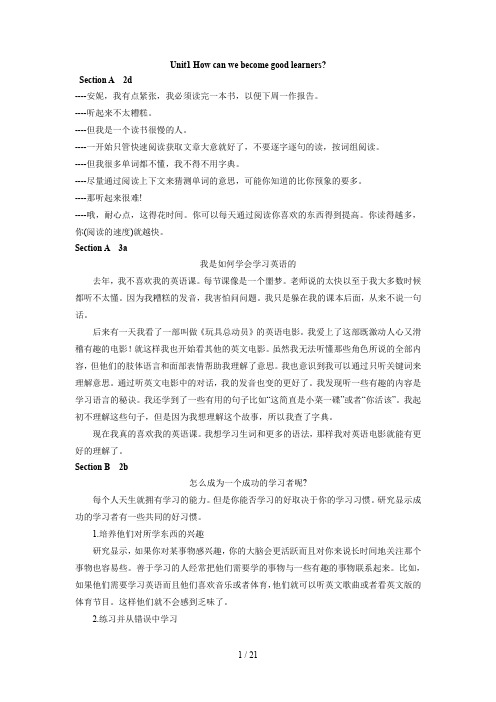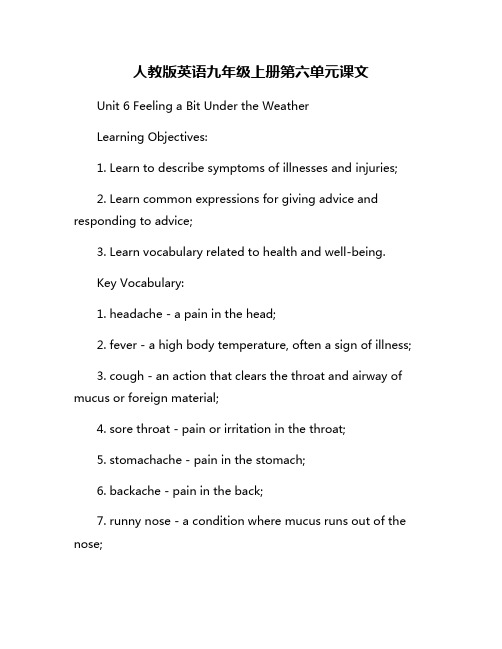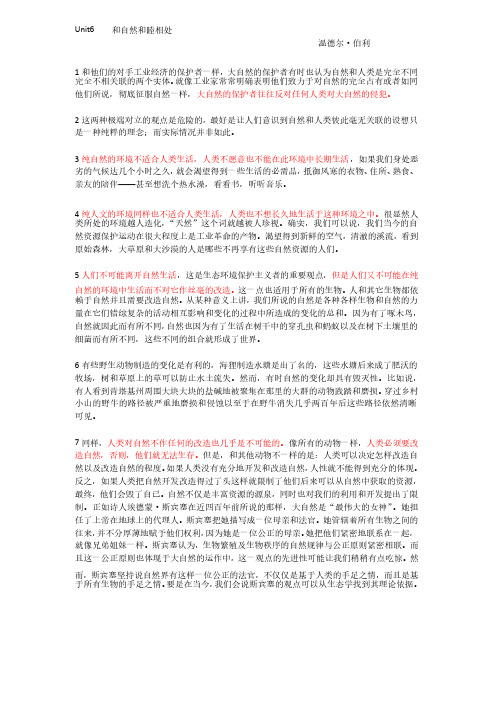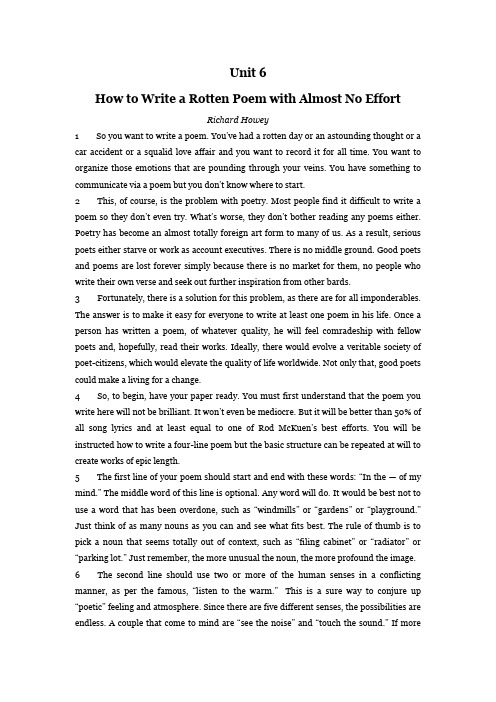九级英语Unit6课文翻译
人教版九年级英语1-14单元课文翻译

Unit1 How can we become good learners?Section A 2d----安妮,我有点紧张,我必须读完一本书,以便下周一作报告。
----听起来不太糟糕。
----但我是一个读书很慢的人。
----一开始只管快速阅读获取文章大意就好了,不要逐字逐句的读,按词组阅读。
----但我很多单词都不懂,我不得不用字典。
----尽量通过阅读上下文来猜测单词的意思,可能你知道的比你预象的要多。
----那听起来很难!----哦,耐心点,这得花时间。
你可以每天通过阅读你喜欢的东西得到提高。
你读得越多,你(阅读的速度)就越快。
Section A 3a我是如何学会学习英语的去年,我不喜欢我的英语课。
每节课像是一个噩梦。
老师说的太快以至于我大多数时候都听不太懂。
因为我糟糕的发音,我害怕问问题。
我只是躲在我的课本后面,从来不说一句话。
后来有一天我看了一部叫做《玩具总动员》的英语电影。
我爱上了这部既激动人心又滑稽有趣的电影!就这样我也开始看其他的英文电影。
虽然我无法听懂那些角色所说的全部内容,但他们的肢体语言和面部表情帮助我理解了意思。
我也意识到我可以通过只听关键词来理解意思。
通过听英文电影中的对话,我的发音也变的更好了。
我发现听一些有趣的内容是学习语言的秘诀。
我还学到了一些有用的句子比如“这简直是小菜一碟”或者“你活该”。
我起初不理解这些句子,但是因为我想理解这个故事,所以我查了字典。
现在我真的喜欢我的英语课。
我想学习生词和更多的语法,那样我对英语电影就能有更好的理解了。
Section B 2b怎么成为一个成功的学习者呢?每个人天生就拥有学习的能力。
但是你能否学习的好取决于你的学习习惯。
研究显示成功的学习者有一些共同的好习惯。
1.培养他们对所学东西的兴趣研究显示,如果你对某事物感兴趣,你的大脑会更活跃而且对你来说长时间地关注那个事物也容易些。
善于学习的人经常把他们需要学的事物与一些有趣的事物联系起来。
+Unit+6+Section+B+2a-2e 人教版九年级英语全册+

How many teams are there in one game?
divide /dɪˈvaɪd/ vt. 分开,分散 divide... into...把...分成... be divided into...被分成...
The players are usually divided into two teams. The colors of the clothes of the two teams are different. But he color of the clothes of the same team is the same.
家篮球协会(美国职业篮球联赛)
People also watch basketball games in the_C_B__A__g_am__e_s____. China Basketball Association /əˌsəʊsɪˈeɪʃən/中国篮球协会(中国
职业篮球联赛)
What do you know about the history of basketball?
Unit 6 When was it invented?
Section B 2a-2e
2a What do you know about the sport, basketball?
Where is basketball often played?
People often play basketball in the basketball games/ matches.
Hale Waihona Puke Para 1.The popularity and development of the basketball.
Para 2. General introduction of basketball
人教版英语九年级上册第六单元课文

人教版英语九年级上册第六单元课文Unit 6 Feeling a Bit Under the WeatherLearning Objectives:1. Learn to describe symptoms of illnesses and injuries;2. Learn common expressions for giving advice and responding to advice;3. Learn vocabulary related to health and well-being.Key Vocabulary:1. headache - a pain in the head;2. fever - a high body temperature, often a sign of illness;3. cough - an action that clears the throat and airway of mucus or foreign material;4. sore throat - pain or irritation in the throat;5. stomachache - pain in the stomach;6. backache - pain in the back;7. runny nose - a condition where mucus runs out of the nose;8. sneeze - to make a sudden involuntary expulsion of air from the nose and mouth.Dialogue 1A: Are you feeling okay?B: No, I'm not feeling well. I have a terrible headache.A: Maybe you should take some painkillers and rest.B: Yeah, I think I'll do that. Thanks for the advice.Dialogue 2A: I have a fever and a sore throat. What should I do?B: You should drink plenty of water and get some rest. If it doesn't get better, you should see a doctor.A: Thanks for the advice. I'll try that.Practice Exercises:1. Listen to the audio and repeat after the speaker to practice pronunciation;2. Role-play different scenarios where someone is feeling unwell and needs advice;3. Write a short paragraph describing a time when you were sick and what you did to feel better.Overall, Unit 6 focuses on health and well-being, teaching students how to describe symptoms, give advice, and respond to advice. By the end of the unit, students should be able to communicate effectively about their health and understand common expressions related to illnesses and injuries.。
研究生学位英语课文全文翻译-unit6

Unit6 和自然和睦相处温德尔·伯利1和他们的对手工业经济的保护者一样,大自然的保护者有时也认为自然和人类是完全不同完全不相关联的两个实体。
就像工业家常常明确表明他们致力于对自然的完全占有或者如同他们所说,彻底征服自然一样,他们所说,彻底征服自然一样,大自然的保护者往往反对任何人类对大自然的侵犯。
大自然的保护者往往反对任何人类对大自然的侵犯。
2这两种极端对立的观点是危险的,最好是让人们意识到自然和人类彼此毫无关联的设想只是一种纯粹的理念;而实际情况并非如此。
3纯自然的环境不适合人类生活,人类不愿意也不能在此环境中长期生活,如果我们身处恶劣的气候达几个小时之久,就会渴望得到一些生活的必需品,抵御风寒的衣物、住所、熟食、亲友的陪伴——甚至想洗个热水澡,看看书,听听音乐。
4纯人文的环境同样也不适合人类生活,人类也不想长久地生活于这种环境之中。
很显然人类所处的环境越人造化,“天然”这个词就越被人珍视。
确实,我们可以说,我们当今的自然资源保护运动在很大程度上是工业革命的产物。
然资源保护运动在很大程度上是工业革命的产物。
渴望得到新鲜的空气,渴望得到新鲜的空气,渴望得到新鲜的空气,清澈的溪流,清澈的溪流,看到原始森林,大草原和大沙漠的人是哪些不再享有这些自然资源的人们。
5人们不可能离开自然生活,这是生态环境保护主义者的重要观点,,这是生态环境保护主义者的重要观点,但是人们又不可能在纯但是人们又不可能在纯自然的环境中生活而不对它作丝毫的改造。
这一点也适用于所有的生物。
人和其它生物都依赖于自然并且需要改造自然。
从某种意义上讲,我们所说的自然是各种各样生物和自然的力量在它们错综复杂的活动相互影响和变化的过程中所造成的变化的总和。
因为有了啄木鸟,自然就因此而有所不同,自然也因为有了生活在树干中的穿孔虫和蚂蚁以及在树下土壤里的细菌而有所不同,这些不同的组合就形成了世界。
6有些野生动物制造的变化是有利的,海狸制造水塘是出了名的,这些水塘后来成了肥沃的牧场,树和草原上的草可以防止水土流失。
Unit-6-Travel-Around-the-World课文翻译大学体验英语三

Unit 6 Travel Around the WorldPassage A The Woman Taxi Driver In CairoHer name is Nagat.I first saw her outside Cairo's airport terminal. A woman taxi driver - the only woman, for that matter, among a large crowd of her male counterparts.Do you know what it is like to arrive in a strange city in the middle of the night? Nobody, not even a ray of sunshine is here to greet you. When I walk out of the terminal, I am facing the crowd of taxi drivers milling about in front of every airport the world over. Here in Cairo, it is large and noisy. "Taxi!" "You want taxi?" I hear all round me.I feel a firm hand holding my left arm. "You want taxi, follow me," the woman says. She doesn't ask, she simply pulls me through the crowd. I follow her willingly. There is this moment when a tourist, particularly a woman, simply has to trust someone. We stop at a worn car. It has seen a better day, there are quite a few scrapes on its body, the tires are bald and there is a crack in the windshield. But it is a car for hire, and the woman will personally drive me. I breathe a sigh of relief when she puts my bag into the trunk, locks it and gets behind the wheel. "I will drive you, don't worry," she says.Nagat, as she now explains to me, works as a taxi driver several days and nights a week. She has another job, working in an office, but details of it remain vague. The little old car is not hers; it belongs to a boss from whom she in turn rents it whenever she can. She has been a driver ever since her husband died some ten years earlier and left her with two teenage kids and her parents to support.She knows every nook and cranny in and around Cairo - no easy feat. Cairo with its complex system of streets and lanes, its quarters and markets is like a labyrinth invented by ancient storytellers. Hundreds of mosques - many of which are masterpieces of Islamic architecture, old neighborhoods with houses boxed together, huge apartment buildings on the outskirts and the Nile calmly running through it; all are part of this overcrowded city.With a mild sense of humor around a deep core of understanding of human nature, Nagat takes control of my sightseeing schedule. Every morning punctually at nine o'clock, I can depend on seeing her short, solid frame outside the hotel lobby, her round face turning into a big smile as soon as she sees me coming down the stairs. Most every day, she wears an earth tone-colored Jellaba. Her movements are energetic and she doesn't waste any time. Her determined approach seems to have grown on a bed of economy, onthe necessity to get as much done as she possibly can.What becomes clear to me soon as she drives me from museum to pyramid, from one part of town to the opposite, is this: she is a true exception here. Wherever we stop, be it for a cup of tea during a break or upon arriving at a historical site where her male colleagues gather in the parking area - everywhere, she is being noticed. Men walk up to her in the car with questioning faces. As she tells me, they all have one question first of all: "Are you a taxi driver?" She then explains in a few short sentences, and I see the men's faces soften, smile and respectfully and kindly chat with her. This scene repeats itself over and over again. I get the sense that she invites goodwill from the people she meets.Nagat is proud and independent. One day, as I find her waiting outside a museum, she is just taking a spare tire out of the trunk of the taxi. One of the bald tires had finally gone flat, and she was going to change it herself. Several curious people gather around her and she receives offers of help - but no, she wants no part of that. In her efficient, deliberate manner, she changes the tire, and having done so, washes her hands with bottled water, gets in the taxi and asks "Where to now?"Should you find yourself at Cairo's airport, look for Nagat outside the international arrival hall. If you are lucky, you will have a chance to see Cairo through the eyes of a woman taxi driver.开罗的女出租车司机她叫娜格特。
Unit 6 How to Write a Rotten Poem with Almost No Effort课文翻译综合教程三

Unit 6How to Write a Rotten Poem with Almost No EffortRichard Howey1 So you want to write a poem. You’ve had a rotten day or an astounding thought or a car accident or a squalid love affair and you want to record it for all time. You want to organize those emotions that are pounding through your veins. You have something to communicate via a poem but you don’t know where to start.2 This, of course, is the problem with poetry. Most people find it difficult to write a poem so they don’t even try. What’s worse, they don’t bother reading any poems either. Poetry has become an almost totally foreign art form to many of us. As a result, serious poets either starve or work as account executives. There is no middle ground. Good poets and poems are lost forever simply because there is no market for them, no people who write their own verse and seek out further inspiration from other bards.3 Fortunately, there is a solution for this problem, as there are for all imponderables. The answer is to make it easy for everyone to write at least one poem in his life. Once a person has written a poem, of whatever quality, he will feel comradeship with fellow poets and, hopefully, read their works. Ideally, there would evolve a veritable society of poet-citizens, which would elevate the quality of life worldwide. Not only that, good poets could make a living for a change.4 So, to begin, have your paper ready. You must first understand that the poem you write here will not be brilliant. It won’t even be mediocre. But it will be better than 50% of all song lyrics and at least equal to one of Rod McKuen’s best efforts. You will be instructed how to write a four-line poem but the basic structure can be repeated at will to create works of epic length.5 The first li ne of your poem should start and end with these words: “In the — of my mind.” The middle word of this line is optional. Any word will do. It would be best not to use a word that has been overdone, such as “windmills” or “gardens” or “playground.” Just think of as many nouns as you can and see what fits best. The rule of thumb is to pick a noun that seems totally out of context, such as “filing cabinet” or “radiator” or “parking lot.” Just remember, the more unusual the noun, the more profound the image.6 The second line should use two or more of the human senses in a conflicting manner, as per the famous, “listen to the warm.”This is a sure way to conjure up “poetic” feeling and atmosphere. Since there are five different senses, the possibilities are e ndless. A couple that come to mind are “see the noise” and “touch the sound.” If morecomplexity is desired other senses can be added, as in “taste the color of my hearing,” or “I cuddled your sight in the aroma of the night.” Rhyming, of course, is option al.7 The third line should be just a simple statement. This is used to break up the insightful images that have been presented in the first two lines. This line should be as prosaic as possible to give a “down-to-earth” mood to the poem. An example wou ld be “she gave me juice and toast that morning,” or perhaps “I left for work next day on the 8:30 bus.” The content of this line may or may not relate to what has gone before.8 The last line of your poem should deal with the future in some way. This gives the poem a forward thrust that is always helpful. A possibility might be, “tomorrow will be a better day,” or “I’ll find someone sometime,” or “maybe we’ll meet again in July.” This future-oriented ending lends an aura of hope and yet need not be grossly optimistic.9 By following the above structure, anyone can write a poem. For example, if I select one each of my sample lines, I come up with:In the parking lot of my mind,I cuddled your sight in the aroma of the night.I left for work next day on the 8:30 bus.Maybe we’ll meet again in July.10 Now that poem (like yours, when you’re finished) is rotten. But at least it’s a poem and you’ve written it, which is an accomplishment that relatively few people can claim.11 Now that you’re a poet, feel free to read poetry by some of your more accomplished brothers and sisters in verse. Chances are, you’ll find their offerings stimulating and refres hing. You might even try writing some more of your own poems, now that you’ve broken the ice. Observe o thers’ emotions and experience your own —that’s what poetry is all about.12 Incidentally, if you find it impossible to sell the poem you write to Bobby Goldsboro or John Denver, burn it. It will look terrible as the first page of your anthology when it’s published.轻轻松松写烂诗理查德·豪伊1. 这一天你过得很糟糕,或是有了个绝妙的想法,又或者遭遇车祸,再或情场失意,你想把它永久记录下来。
九年级英语unit6课文知识点讲解

九年级英语unit6课文知识点讲解Unit 6 'What's in a name?' is an intriguing and thought-provoking chapter in the ninth-grade English textbook. This unit delves into the realm of names, exploring their meanings, cultural significance, and impact on our lives. In this article, we will delve into the key points of this unit, examining the various aspects surrounding names.The unit begins by introducing the concept of names and their importance in different cultures. Names not only identify individuals but also carry unique meanings and connotations. It highlights the Western tradition of naming children after their ancestors or in honor of someone significant. Conversely, Eastern cultures often prioritize names that reflect characteristics or desired qualities.The chapter then delves into the significance of names in African cultures, particularly Ghana. In these cultures, names hold deep meaning and are chosen carefully to reflect the story behind a child's birth or the desired traits they hope the child will possess. It sheds light on the wisdom behind these naming traditions, emphasizing the long-lasting impact of a name on one's identity.Moving forward, the unit explores the concept of nicknames. Nicknames are informal labels that individuals adopt, typically basedon specific qualities or attributes. While nicknames can be endearing and foster a sense of camaraderie, they can also perpetuate stereotypes or reinforce social hierarchies. The chapter prompts reflection on the impact that nicknames can have on one's sense of self.Continuing on, the unit delves into the realm of brand names and their significance. It discusses the power of brand names in influencing consumer behavior and creating brand loyalty. The chapter highlights the psychological impact of brand names, shedding light on how companies employ various marketing strategies to foster brand recognition and resonance. It serves as a reminder of the influence that names carry beyond individual identities.Furthermore, the unit touches on the concept of pseudonyms and the reasons individuals choose to adopt them. Whether it be for artistic expression or personal reasons, pseudonyms provide individuals with an alternative identity under which they can freely operate. The chapter explores famous pseudonyms, such as Mark Twain, and prompts students to consider the reasons behind the adoption of such alternative identities.Lastly, the unit explores the impact of changing one's name. It highlights the various reasons why individuals may choose to changetheir names, ranging from personal preference to assimilation into different cultures. The chapter emphasizes the significance of this decision and prompts students to reflect on the potential consequences and opportunities associated with changing one's name.In conclusion, Unit 6 'What's in a name?' provides invaluable insights into the world of names and their multifaceted role in shaping our identities, cultures, and societies. By delving into various aspects of names, from cultural traditions to nicknames, brand names, pseudonyms, and even name changes, this unit challenges students to critically examine the significance and impact of names in our lives. It invites them to consider the power that names hold and the responsibility that comes with their use.。
- 1、下载文档前请自行甄别文档内容的完整性,平台不提供额外的编辑、内容补充、找答案等附加服务。
- 2、"仅部分预览"的文档,不可在线预览部分如存在完整性等问题,可反馈申请退款(可完整预览的文档不适用该条件!)。
- 3、如文档侵犯您的权益,请联系客服反馈,我们会尽快为您处理(人工客服工作时间:9:00-18:30)。
保罗:嘿,罗伊,这次我们学校地项目任务地主题是“改变世界地小发明”.你能帮我想一个小发明吗?
罗伊:我很乐意!让我想想…..嗯……有啦!拉链!
保罗:拉链?它真是这样一项了不起地发明吗?
罗伊:想想在我们地日常生活中会多么频繁地使用它吧.你能看见拉链在裙子、裤子、鞋子、背包上…..无处不在!文档来自于网络搜索
保罗:嗯,看来你说地确实有道理…….
罗伊:当然!我想到它是因为我上周看到一个网站.不同发明地创始者都被列在上面.比如说,它提到拉链是在年被惠特科母.贾德森发明地.不过那时候它并没有被广泛使用.文档来自于网络搜索
保罗:真地吗?那它是什么时候流行起来地.?
罗伊:年左右.
一项偶然地发明
你知道茶,作为世界上最受欢迎地饮料(仅次于水),是一项偶然地发明吗?许多人都认为在年以前就开始了饮茶.据说一位叫神农地中国统治者最早发现茶可以引用.一天,神农在户外地炉火上烧水,茶树上有几片叶子掉入水里,过了一会,散发出怡人地香味,于是神农品尝了这褐色地水,它非常香醇,就这样,世界上最受欢迎地饮料之一被发明了.文档来自于网络搜索
数千年后,“茶圣”陆羽在他地《茶经》一书中提到了神农.该书描述了如何种植茶树和泡茶,它还讨论了什么地方出产最好地茶叶,而且还应该使用什么样地水来泡茶.文档来自于网络搜索
人们认为茶是在公元世纪传播到日本和朝鲜.在英国,大约直到年才发现,但不到年地时间里,茶已经成为国饮.从中国到西方地茶叶贸易始于世纪.这使得茶树和茶叶传播到世界更多地方,使之深受欢迎.虽然现在又许多人都了解一些茶文化,但毫无疑问地是,中国人才是最了解茶之本质(精髓)地人.文档来自于网络搜索
你知道篮球是什么时候发明地吗?
篮球是一项许多人都喜爱地积极运动,它既有趣有健身.篮球有多年地历史,而且有多个国家,超过亿人都在玩篮球.普遍认为年地月日是历史上第一场篮球比赛地日子.然后再年地柏林,篮球成为奥运会比赛项目.文档来自于网络搜索
篮球是有一位名叫詹姆斯.奈史密斯地加拿大医生发明地,他出生于年.当他在大学任教时,被要求发明一项能让人冬天在室内玩地游戏.他把他班级里地人分成两队人员,教他们玩他地新游戏.同一个队地成员必须一起努力投进对方地篮筐.同时,他们还要阻止对方把球投进他们自己队地篮筐.文档来自于网络搜索
如今,许多年轻人都梦想成为著名地篮球运动员,篮球在世界各地越来越普及.在中国,有时你看见人们在公园、学校甚至工厂打篮球.篮球不仅成为人们喜欢玩地运动,也成为一项人们喜欢观看地运动.虽然美国地比赛是最著名地,但中国地比赛也越来越受欢迎.中地外国球员数量有所增加,其中也包括中国球员.也有越来越多地外籍球员加入到地赛事中.许多年轻人都仰慕这些篮球英雄,并想成为像他们一样地人.这些球星也鼓励着年轻人为实现自己
地梦想而努力.文档来自于网络搜索。
